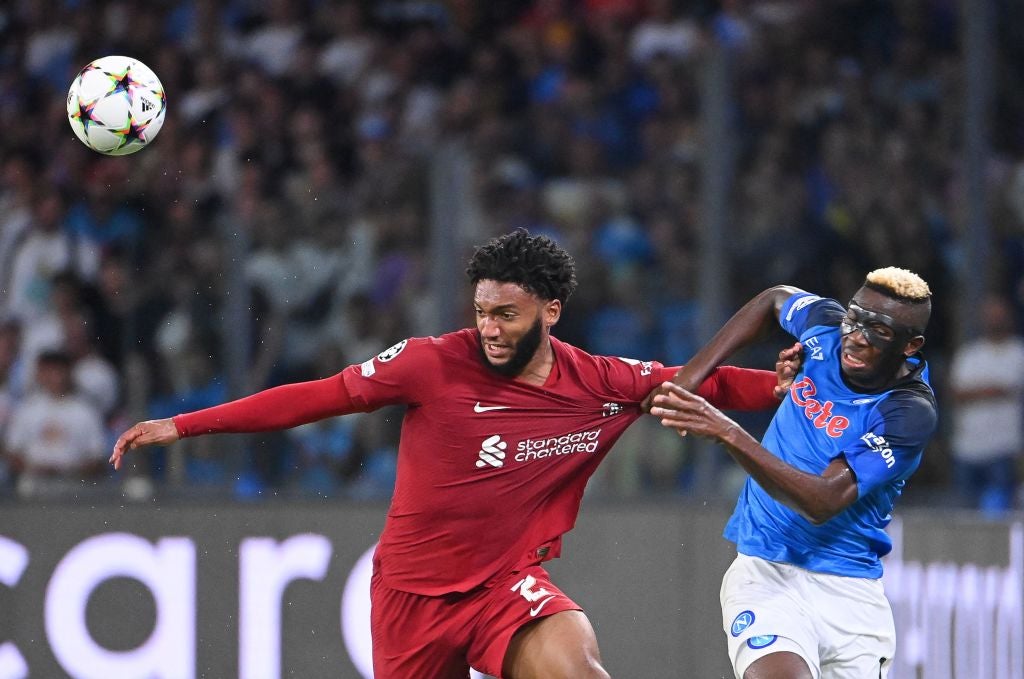
The first time Jurgen Klopp brought a team to Naples, he made an explosive exit. Then Borussia Dortmund manager, he was sent to the stands. All of which might have seemed preferable to a vigil on the touchline, watching his Liverpool plumb new depths. Conceding four goals in the first 47 minutes gave him plenty of time to ponder. His departure was contrite this time, arms raised in apology to the Liverpool fans. Their visit to their least favourite ground was even less enjoyable than usual.
The euphoric celebrations in front of an adoring home crowd felt Klopp-esque, but came from Napoli. For the German, there was instead a disconsolate trudge back to the tunnel and an acknowledgement that could prove a watershed moment. Sometimes it takes spectacular scorelines to bring change and, after Napoli demolished Liverpool to win 4-1, Klopp said: “It looks like we have to reinvent ourselves.”
The caveat was that his version of reinvention sounded like a return to the immediate past, rather than a promise of revolution. “Everybody would be happy if we could play the stuff we used to play,” he said; only a few months ago, too. The aim is to restore the basics, to become horrible to play against by putting opponents under pressure.
For Klopp, being compact is a compliment and he could not remember seeing his side less compact; Andy Robertson concurred in his unsparing analysis. “The way we were wide open they found so many spaces,” the Scot said. But, the manager said, his high defensive line stays.
But if the problem was not the theory but the execution, it raises questions about the individuals involved. In part, injuries are the issue; in part, form is and it is rare that so many of Klopp’s talismans are out of form at the same time. And yet it scarcely feels as simple as saying that such things are cyclical; if it is inevitable some, and perhaps all, will play better, that does not necessarily mean their best days lie ahead.
Seven of this side had started the Champions League final; it is little more than three months ago and this was only their fourth defeat of 2022 but it came in such a manner to suggest an era is ending.
Six of them are thirty-somethings. Logically, playing something as exhausting as Kloppball for 60 games a season will take its toll.
There is increasing evidence to suggest time has finally caught up with James Milner. Pushing 37, he was playing in the Premier League before Harvey Elliott was born. Perhaps he can still win the bleep test, but not the midfield battle. Within 10 minutes, he had conceded a penalty and upended Andre-Frank Zambo Anguissa in the kind of ugly lunge where a caution feels the lesser possible punishment.
Alongside him, Fabinho was the target of much of Klopp’s invective during the break when VAR awarded Napoli their second penalty. It was unsurprising: the Brazilian scarcely protected the creaking defence.
Yet the most jarring sights came behind him. Virgil van Dijk has started to look a mere mortal, the imperious, laidback colossus feeling more fallible. He went 150 games without conceding a penalty. Now he has given away two in seven games, with both Aleksandar Mitrovic and Victor Osimhen upended by the usual paragon of perfect judgement. Only a nonchalant goal-line clearance made him look the effortless master but whereas his calm authority used to permeate across the defence, Liverpool were ragged.
Van Dijk was still superior to his partner. Joe Gomez was atrocious, culpable for two goals and, but for the Dutchman’s intervention on his line, a hat-trick of horrors; his inconsistency remains a concern when, at 25, he is no longer a young player and cannot use age, at either end of the spectrum, as an excuse. His best is a level few others can reach, his worst dreadful and they can coincide with Liverpool’s most chastening games.

Gomez was dire in the 7-2 defeat to Aston Villa, the 4-0 thrashing at Manchester City and now the nightmare in Naples; he was hauled off long before the final whistle in each. Gomez was Van Dijk’s finest sidekick for much of the 2019-20 season and if injuries are the main reason why he has been reinvented as fourth choice since then, the second-half introduction of Joel Matip was telling.
In a wretched rearguard, the right half felt the weaker link. Trent Alexander-Arnold was unable to contain a rampant Khvicha Kvaratskhelia; at times, he was not near enough to try.
The young Georgian graced the vast atmospheric concrete bowl. His nickname, “Kvaradona” and the former San Paolo Stadium, now the Stadio Diego Armando Maradona, stem from football’s greatest left-footer. Liverpool’s finest in recent times had a humbling night: Mohamed Salah was anonymous and substituted on a night to enhance the reputations of the dynamic Luis Diaz and the departed Sadio Mane.
Reinvention comes in many guises and if Klopp was left to ponder if his ageing players can again be the forces of old, Liverpool could do with Salah playing as he did when he earned the biggest contract in their history, not as he has since signing it.







